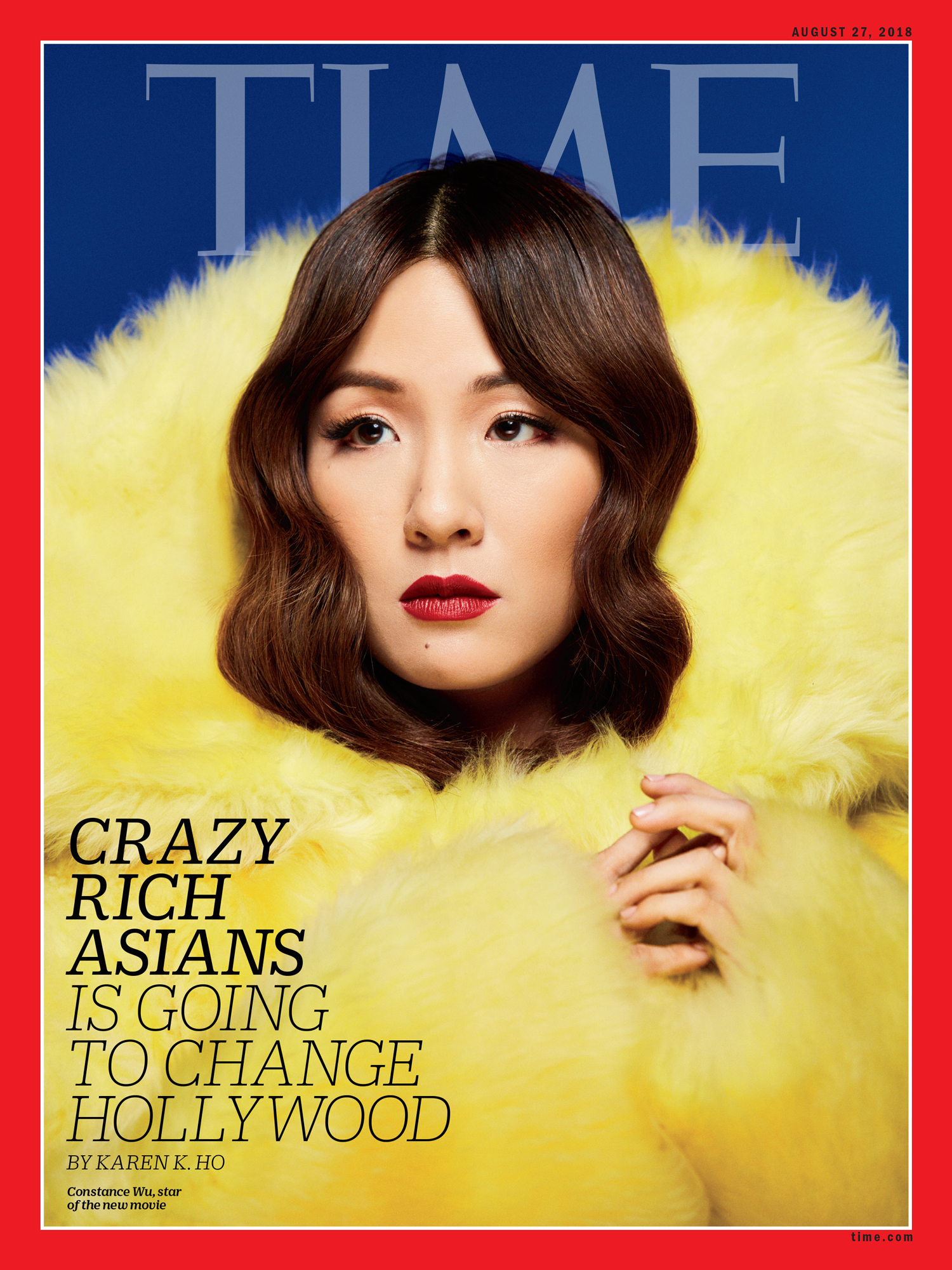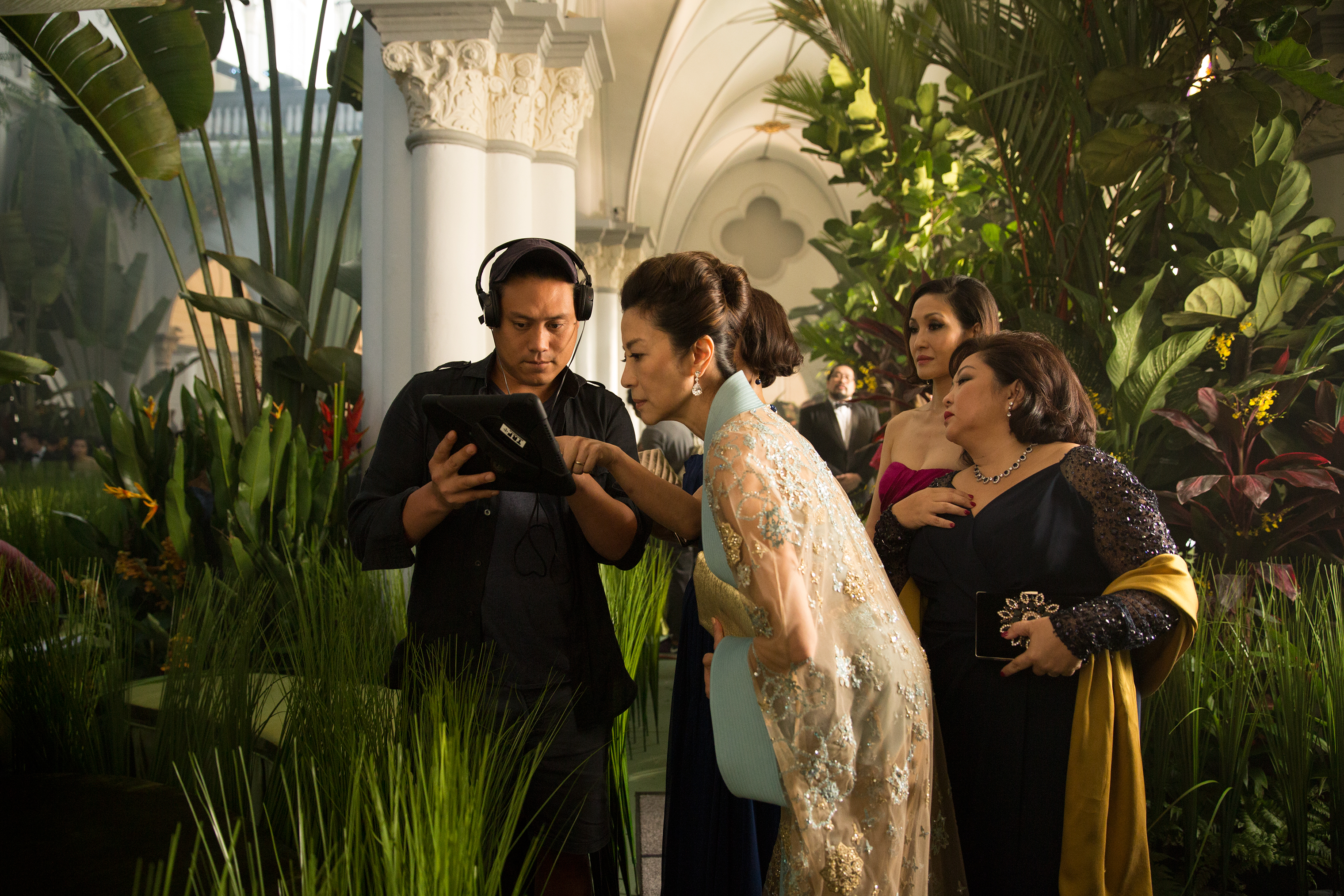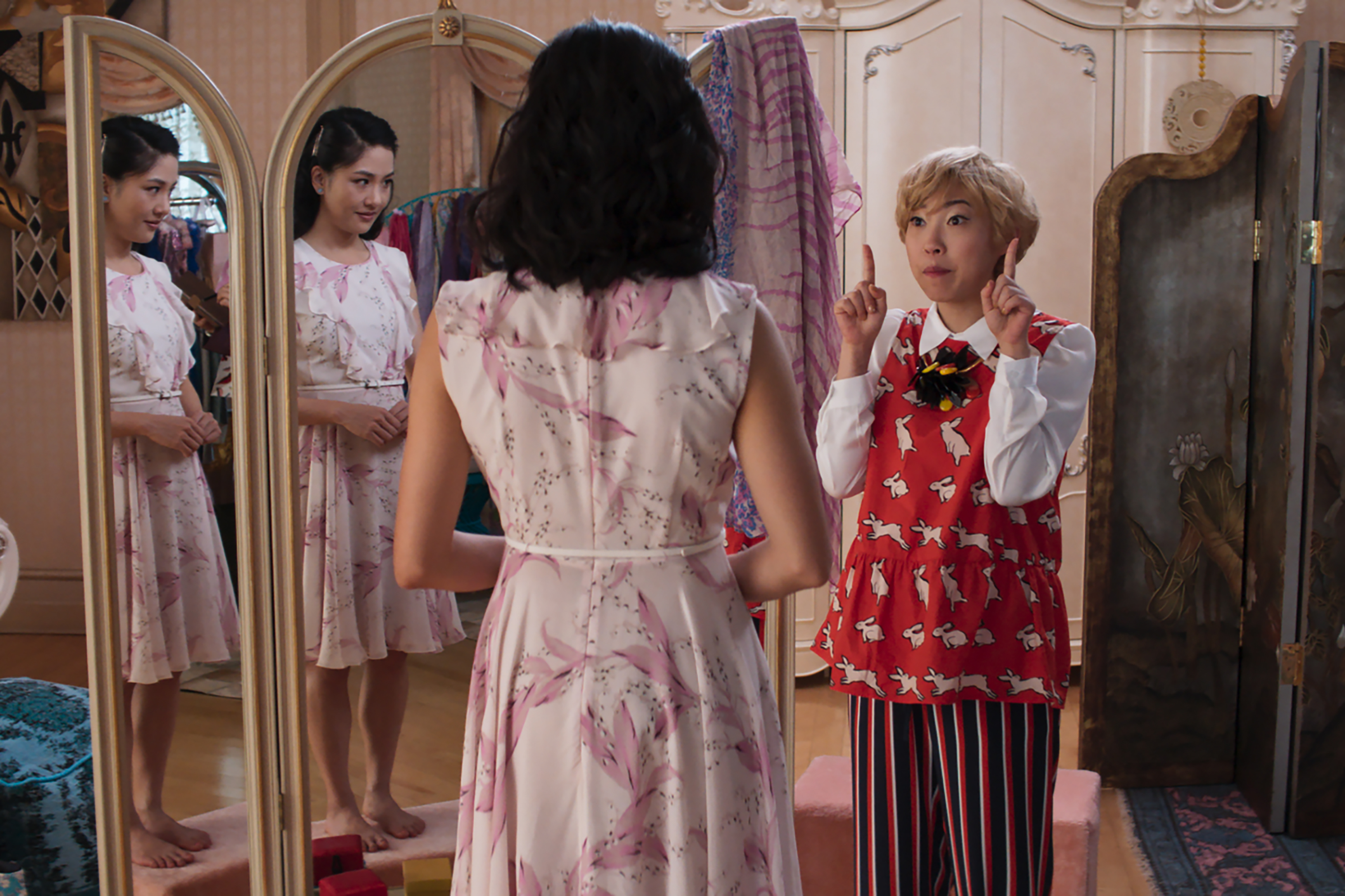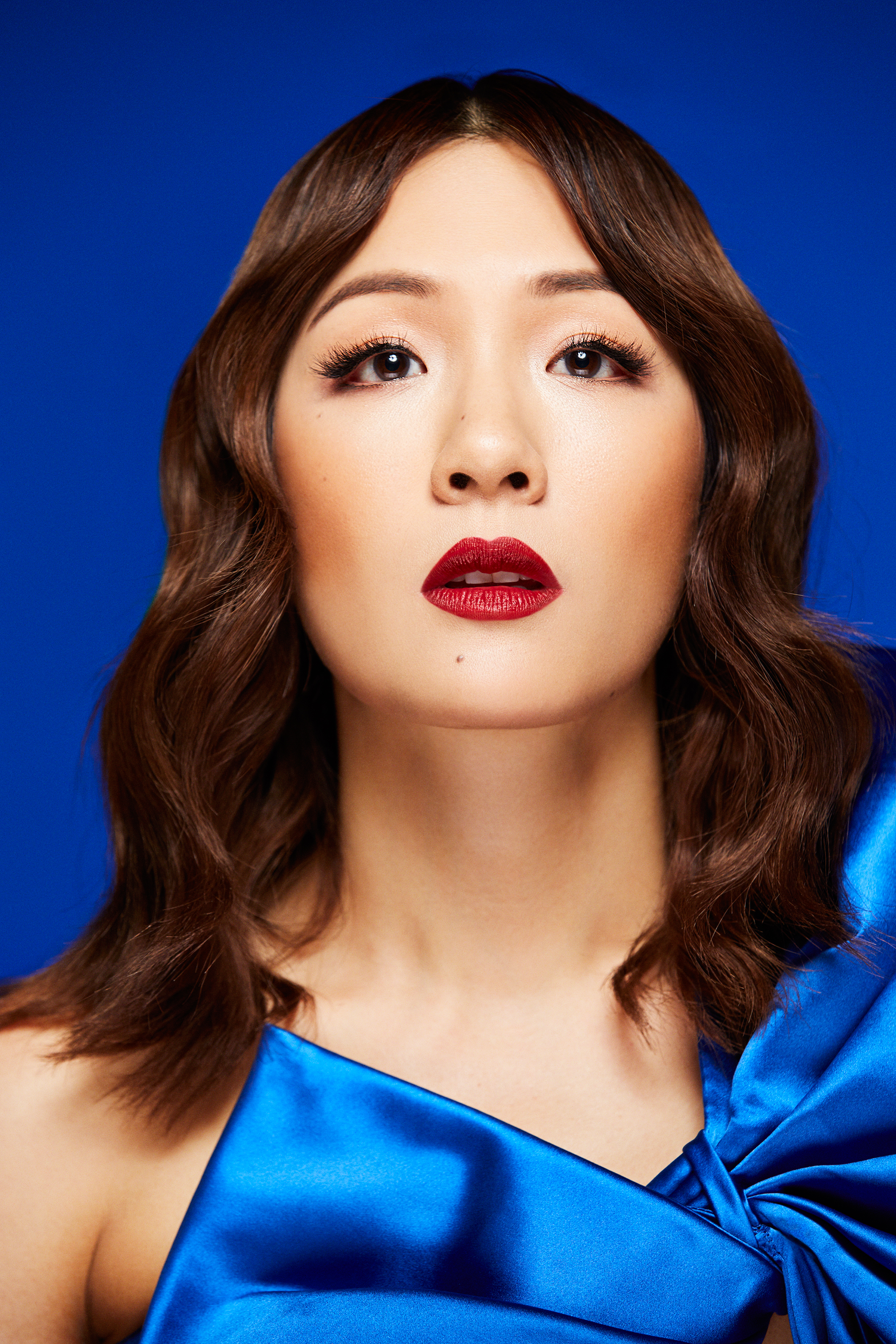There’s a scene in Crazy Rich Asians in which Rachel Chu, the lead character played by Constance Wu, is in a game of poker. Her hand is much weaker than her opponent’s—he’s got two pairs—but she fearlessly bluffs and puts in all her chips. He folds, only to be crushed when she reveals her cards. As Rachel, a professor of economics and game theory at New York University, tells her students, “The key is playing to win, instead of trying not to lose.”
To many in Hollywood, Crazy Rich Asians might look like a risky bet. It’s the first modern story with an all-Asian cast and an Asian-American lead in 25 years; the last, The Joy Luck Club, was in 1993. It’s an earnest romantic comedy in a sea of action and superhero films. It features two leads who are new to movies: Wu, an actor most recognizable for her role on the ABC series Fresh Off the Boat, and Henry Golding, a virtual unknown who last worked as a travel host for the BBC. And it makes use of a multilingual script that flips seamlessly from English to Cantonese to Mandarin and back again.
But if you understand the cultural forces that are at play—an underserved audience, the rapidly expanding influence of Asian culture and the power of the global box office, this $30 million movie doesn’t seem like much of a gamble at all. In fact, it seems destined to be a hit. Crazy Rich Asians is pure escapist fantasy, a Cinderella story about an Asian-American woman meeting her boyfriend’s colorful and, yes, crazy-rich family in Singapore. It also boasts a relatable rom-com heroine, opulent set pieces and witty dialogue. It has already won over critics: the film has a 96% score on Rotten Tomatoes.
That doesn’t mean getting this movie made was easy. An early prospective producer suggested casting a white woman as the lead. Later, the filmmakers turned down a lucrative deal with Netflix to make the film with Warner Bros., which guaranteed it a higher-profile release. This mattered, both for fans of Kevin Kwan’s best-selling book series, which inspired the film, and for Asian audiences the world over who have waited decades to see themselves represented onscreen in all their diversity. Hollywood has grown increasingly dependent on Asian financiers and global audiences to turn a profit. Crazy Rich Asians has the potential to revive the romantic comedy—a genre that has foundered at the box office recently—for a massive general audience. By representing Asian people so vividly, the film could set a precedent for many more stories like this one to be told. It’s coming at the right moment. After years of work in the game of Hollywood, Crazy Rich Asians is poised to win.

For Wu, the film’s success is about so much more than just its ability to establish her as a marquee star. Wu first broke out on a sitcom, and she has killer comedic timing—but she’s also deadly serious, and fiercely outspoken, about issues of representation and equality.
For decades, Asian Americans working in the film and television industry have carried the impossible burden of fixing a system that has tended to punish, stereotype and ignore them. “They think we’ll say yes to anything and we’ll just be grateful,” Wu tells me as we walk around the Silver Lake Reservoir in Los Angeles a few weeks before the film’s release.
Wu is, nonetheless, grateful. With her experience on Fresh Off the Boat, the first network comedy to feature Asian-American leads since Margaret Cho’s show All-American Girl in 1994, the Taiwanese-American actor has now had the unique experience of being featured in two milestone projects about Asian Americans. This matters to her. Both she and the film’s director, Jon M. Chu, she says, are Asian-American pioneers. “We are not supporting roles,” Wu says. “We are stars on our own journeys.”
Her casting in this film as Rachel signals that she’s the most bankable Asian-American movie star in a generation. But Wu has spent years discussing the state of Asian representation, both in interviews and with fans, and a sense of pressure has made her terrified of what will happen when the film is finally out.
Behind the smiling Instagram posts and glossy photo shoots ahead of the movie’s release, Wu tells me she has been having panic attacks and crying every night. She’s not typically an anxious person, but she’s sensitive, which is part of what makes her such a great, funny actor and outspoken advocate of women’s issues and greater diversity in her field. It also means that she’s vulnerable to criticism about everything from her hair to her pronunciation of Mandarin to her love life. “I’m really scared of being such a public figure and opening myself up to scrutiny,” Wu says. “I’m very panicked that I’m not going to be able to handle it, and I’m just going to have hurt feelings for a really long time.”
For so long, Asian-American women have been told to be grateful for whatever they get, and that being objectified is better than being ignored. But Wu’s clear ideas about the type of work she wants to do, along with her race and gender, have made her a target on and off sets. “I couldn’t do a shoot because I had a sick family member, and I was punished for it,” she says. “Even saying I’m worthy of being a leading lady—people don’t like it when a woman asserts her worth.” But her experience on Crazy Rich Asians, being supported by people with the same commitment to representation that’s guided her career, was more positive. “At the end of the day, the thing that drives people and moves people is truth and story and humanity,” she says. “If you make sure all your work has depth, even if it’s something fun and light like a rom-com, that’s how you make good work.”

In Kwan’s book, Rachel is Chinese-American, raised by an immigrant single mom with decidedly American values. Her boyfriend Nick Young is the scion of a Singaporean family that is described as “richer than God.” When Rachel goes to the Southeast Asian country to meet Nick’s relatives for the first time, she’s exposed to a world of privilege unlike anything she’s ever seen. While the stories may seem outlandish, the details are from Kwan’s own life. He drew on his upbringing as a member of one of Singapore’s wealthy families, his experience as an immigrant kid in suburban Houston and his observations of his friends and relatives during visits to Asia as they became even richer.
At the time Kwan sold the rights to Crazy Rich Asians, he was already tasked with writing its sequel, China Rich Girlfriend. But as one of the film’s executive producers from the start, he organized a research tour of Asia for other producers, answered questions from screenwriters Adele Lim and Peter Chiarelli, and helped pick the director.
Kwan and the other producers set a high bar. That included independently developing the screenplay for two years, sending casting directors to search for Asian actors in several countries outside of the U.S. and seeking an eye-watering amount of high fashion to rival that in The Devil Wears Prada.
The viewer encounters this glamorous world through Rachel’s eyes, making the film function as much as lifestyle porn as it does as a romantic comedy. It was critical to get the details right. One scene features a ‘Paul Newman’ Rolex Daytona, which holds the record for the most expensive watch ever sold. Several pieces from Hong Kong–based bespoke jeweler Carnet also make an appearance. “These women wouldn’t wear Cartier,” Kwan says of the matriarchs in his story. “Cartier is too common for them.”
Having directed, along with two Step Up movies and the blockbuster G.I. Joe: Retaliation, a pair of documentaries about Justin Bieber, Chu knew a lot about expectations from fans and how even small details could be the subject of fierce scrutiny. “We had a mah-jongg specialist come in and design a game for us and teach us,” Chu says, in order to nail a climactic tête-à-tête between Rachel and Nick’s mother Eleanor, played by the venerable actor Michelle Yeoh. For day-to-day details, such as what food should be served and which language should be used, many of the cast and crew members, but especially Kwan, were treated as on-set experts. “It just opened a channel of communication on a set where it’s usually, ‘Just do what the director says,’” Chu says. “It’s going to exist forever on film—you better do it right.”
Evoking the sights and sounds of an outdoor market and the gleam of ultra-exclusive Mouawad jewelry was important, but even more crucial was the film’s ability to represent the profound tensions within the Asian experience—especially the differences in identifying with mainland Asia vs. the diaspora. Rachel is part of a group that isn’t the dominant culture; when she goes to Singapore, she’s surrounded by people who look more like her, but the way she grew up makes her an outsider.
Moreover, despite the movie’s title, Asian isn’t a monolithic identity—something that’s easier to understand from the vantage point of a cosmopolitan place like Singapore, which serves as a nexus for many Asian experiences. But Hollywood has tended to treat it as one category. “Obviously, Korean is different than Chinese, which is different from the Vietnamese culture, but the way the [American] culture has treated us is a point that we can probably find some common ground on,” Wu says. She’s frustrated by people who don’t seem to understand the differences, especially in the limited number of period and independent films featuring Asian actors. “They think that having an Asian in their movie is the same thing as having an Asian American, and it’s just not,” she says.
While the film is charming you with its romantic-comedy affectations, it’s slyly doing another kind of work as a commentary on class: Rachel’s back-ground is working-class, while her college roommate Goh Peik Lin, a Singapore native, is hilariously rendered as nouveau riche—and then the Youngs are so old-money, they don’t even talk about it. There are Asians from several countries, with different accents and different values—funny housewives, total jerks, devious socialites, air-headed actors and sassy friends. Oh, and hot guys with great abs too.
Few major studio productions explicitly aim to educate their audience, and non-Asian viewers going to this film may just want to see a glitzy rom-com. But many might walk out with a deeper understanding of the class gradations even just within Singaporean society, and the collectivist vs. individualist tensions found in many Asian families. And there’s no obvious stereotyping. For decades, female Asian actors have been asked to portray stereotypes like the vindictive dragon lady, the submissive China doll, the nerdy overachiever or the inert sex worker. Crazy Rich Asians avoids all of these, instead showing the nuances of Asian women’s experiences across generations.
Even Eleanor, who butts heads with Rachel, isn’t a typical potential monster-in-law—she just comes from a different world and thinks only of what’s best for her son and the families that depend on him. “In the old traditional sense, the elders came first. They were always put ahead of us,” Yeoh explains. “That’s how we showed filial piety and love.” The film, Yeoh says, represents “a great opportunity to show our heritage and our traditions from the Asian side.”

Given its ambitions, it’s unsurprising that Crazy Rich Asians has been held to high standards. It was criticized before a single scene was shot—specifically for the casting of British-Malaysian actor Henry Golding as Nick and Japanese-British-Argentine actor Sonoya Mizuno as Araminta Lee. But the litigation of whether mixed-race actors are “Asian enough” has overshadowed the number of cast and crew members who are Straits Chinese, such as Lim, Yeoh, associate producer Janice Chua, actor Tan Kheng Hua and Ronny Chieng, who was born in Malaysia, grew up in Singapore and cinched the multi-national life of his character Edison Cheng by attending law school in Australia. “We strived very hard to match the perfect accent to every actor, and I think we did a pretty amazing job, but sometimes we had to make concessions,” Kwan says. “Like, this actor was amazing, but he’s not going to sound like he went to Hong Kong’s top boarding school his whole life.”
Everyone involved in this film says they hope it will pave the way for a Hollywood that allows many more stories about Asian Americans, with different perspectives, body types and ethnic backgrounds. And they’re counting on that change to happen quickly. For Crazy Rich Asians, the pressure to succeed at the box office is high. But there are several factors already working in the film’s favor.
Kwan’s novels are hugely popular globally, with plenty of non-Asian readers, having sold more than 1 million copies in more than 20 languages. During readings for his first book tour, in 2013, Kwan says it was housewives in Texas and New York City socialites who made up his audience. It happened globally too: “There wasn’t a single Asian person,” he says, recalling a packed reading in Zurich with 300 people. “It was a sea of white faces that came out. To see that level of interest just speaks to the universality of the story. ”
The film is being released in mid-August, traditionally a time when studios dump action films and mediocre comedies. But Crazy Rich Asians is different. Tracking estimates already peg the first-week sales at about $26 million. Warner Bros. screened the film for taste-makers months in advance to help build buzz. That strategy is working: Kwan’s first book is on the New York Times best-seller list again.
The mood in which the movie opens also matters. Recently, Asian culture has exploded in popularity among Western audiences: K-pop supergroup BTS reached No. 1 on the Billboard charts in June, sales of Korean beauty products have tripled since 2015, and Japanese clothing company Uniqlo signed tennis star Roger Federer as its brand representative. Fresh Off the Boat has reached syndication status, meaning many more viewers will have the chance to see it.
After years of saying otherwise, Hollywood has finally realized that telling more inclusive stories is just good business. In the past three years, a number of films—including Straight Outta Compton ($202 million), Creed ($174 million), Get Out ($255 million), Girls Trip ($140 million), and especially Black Panther ($1.3 billion) —have shown that movie projects in a variety of genres with black and female leads as well as directors of color can be hits. Plus, Chu already has something in common with Nancy Meyers, the queen of romantic comedies: both directors have generated over $1 billion in ticket sales worldwide.
Still, there will be other definitions of success, beyond the numbers. Chu dreams of this movie being repeatedly played on a television channel like TBS, and he has heard directly from fans about how it has changed the way they see themselves—including men who tell him they’re “proud to be an Asian dude” and those who never would’ve watched a romantic comedy before. “I didn’t know we would get that kind of reaction,” he says.
Wu hopes for a future with “narrative plenitude” through a wide variety of creative projects, so that one story doesn’t have to represent all Asians, or all Asian Americans—a world in which the ability to tell stories that represent billions of people won’t hinge on one movie’s reception. “When you can be mediocre and still not feel like you have to prove something,” she says. “That’s when you know you’ve hit success.”
- The 100 Most Influential People of 2024
- Coco Gauff Is Playing for Herself Now
- Scenes From Pro-Palestinian Encampments Across U.S. Universities
- 6 Compliments That Land Every Time
- If You're Dating Right Now, You're Brave: Column
- The AI That Could Heal a Divided Internet
- Fallout Is a Brilliant Model for the Future of Video Game Adaptations
- Want Weekly Recs on What to Watch, Read, and More? Sign Up for Worth Your Time
